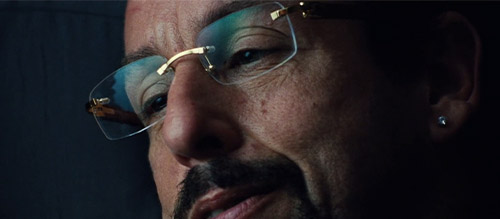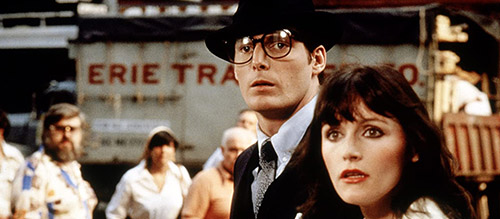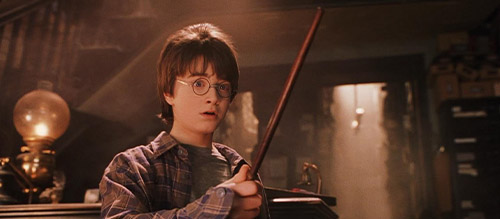Hollywood Spectacles – Nerds, Perverts and the Morally Deviant
This article was written exclusively for The Film Magazine by Ciaran Duncan.
The way our world is visualised in movies and tv affects the way we visualise ourselves. And the way people with glasses are visualised in popular storytelling is bogus, bizarre and irritating. Needing to wear glasses couldn’t just mean an eyeball lens that’s infinitesimally too thick… no, it must mean that the person sporting them is a fragile liability, an individual with no personality outside of being a nerd, or, still more likely, perverted or morally deviant.
Howard in Uncut Gems peeks through the crack in a closet door at his half-naked girlfriend who does not know his creepy ass is in the apartment. The glint of his lenses in the dark is the sickly glow of voyeurism. Patrick Bateman in American Psycho puts on glasses in a boardroom scene where he fantasises about killing a fellow CEO just because of his more expertly watermarked business card. The way he looks at women in particular is proprietary, lethal. Ripley in The Talented Mr Ripley, another serial killer, wears glasses. A pattern emerges: glasses become a simplistic shorthand not for a deficiency in physical sight but a troubling, sometimes even psychotic way of perceiving other people.
In Jaws, Roy Scheider as the central (human) character, police chief Brody, wears glasses and is a good, likable man not purely defined by book smarts. But, (and there’s always a but,) he is average in the scenes where he sports his specs, essentially following around shark-expert Hooper and hunter Quint onto the high seas, where he is only brave enough to go when drunk. In the plunging mayhem of the sea, as the shark writhes its bulk in the quest for blood, a pole knocks off Brody’s glasses. After a few token seconds of disorientation, he shoots the shark in the mouth, detonating the explosive canister in its mighty chompers and making a boom fitting for the Fourth of July. Essentially, at the film’s climax Chief Brody assimilates the characteristics of his more qualified but indisposed colleagues. He has gained the specialist shark knowledge of Hooper and channels some of the gun-toting, macho bravery of Quint, all the while conquering his childhood fear of the sea. But the problem is the way this transformation is symbolised; removal of the glasses means the making of the man. This is perverse. Ok, maybe his sight issue is so minor that he can still get by without his specs, but to be able to pull off this precise, insanely difficult shot that even war-veteran Quint cannot come close to? That is pure movie hokum, and a minor blot in an otherwise glorious film.
That most fundamental symbol of American heroism, Superman, wears glasses in his disguise as Clark Kent. He does not need them, however. It is striking that this is his concession to humanity and human appearance. Christopher Reeve’s classic good looks and buff physique are impossible to ignore, and it is clear to the audience that Superman as Clark Kent is no different as a person, and that he looks the same. But the fiction maintains that this slight physical addition is enough to neuter heroism and make Kal-El an average office worker in the eyes of all around him, unrecognisable even to those who know Superman.
The closest a movie actor has ever gotten to Superman in the American psyche is Cary Grant. In film after film he was the epitome of alpha leading man energy – suave, sexy and capable. Bringing Up Baby, therefore, plays off the image that was developing around Grant, by giving the actor glasses, a surprise move that the studio producing the film tried to put a stop to. The shift in person is negligible, but the accompanying shift in persona is huge. Grant’s character David is nerdy – initially defined entirely by his work on dinosaur skeletons at a museum – and bumbling – over the course of the film he trips over telephone wires and tumbles down ditches. He is awkward, especially with women, extra-especially with Katherine Hepburn’s Susan, the most energetic American to own a leopard pre-‘Tiger King’. He is a reasonably likable, if rather prissy underdog, a relatable figure baffled by a chaotic universe where leopards come to Connecticut. But David breaks and eventually loses his glasses, and this provides the opportunity for Susan to say ‘you’re so good-looking without your glasses’. Cary Grant’s leading man and romantic hero persona emerges in the moment when glasses are destroyed, and he marries Susan.
Grant’s change in Bringing Up Baby is the inverse of countless other films, such as The Princess Diaries, in which, to be considered attractive, women and girls must take part in a makeover scene where their glasses are dispensed with and their hair is literally let loose. For decades, the pursuit of a man was an apparent requirement for women to be protagonists, and to get the guy you had to get rid of the glasses. This is the effect of the male gaze, but in Now, Voyager the transformation of Bette Davis’ character Charlotte Vale is portrayed as an escape from tyrannical matriarchal control. Her mother insists on her wearing glasses at all times and drives her into mental illness with her domineering attitude not to mention her sharp insistence that, ‘No member of the Vale family has ever had a nervous breakdown’. The eye-wateringly problematic element in this otherwise swoon-worthy romantic film is its specious conflation of mental illness with lack of conformity to popular beauty standards. Because at the psychiatric home run by Claude Rains, not only does Charlotte ‘get better’, it turns out she no longer needs her glasses. Rains snaps them, symbolising Charlotte’s transition into the role of a romantic lead. This exact same eye-fixing miracle happens to another girl later in the film. Sign me up to Claude Rains’ magic clinic! Or, actually, don’t. These women are now happier and more appealing to men, and the two are made to seem interrelated. Davis’ glasses don’t snap under Rains’ hands, but under the weight of dodgy patriarchal logic.
What is fast emerging is that glasses and protagonists rarely go together; if we refine our gaze still further and look for heroic glasses-wearers, the pickings are even more scant. This is one of the reasons that (TERF author notwithstanding) “Harry Potter” is a brilliant series of books. The main character is a thoroughly decent, kind boy who is the hero of his own story and also wears glasses. This surprisingly unusual hero is even translated faithfully into that place most beguiled by the cleft jaw and perfect body: Hollywood. Such is Hollywood’s record on characters with glasses I half-expected there to be an added scene in the films where Harry’s sight is magically fixed by Madame Pomfrey in the Hospital Wing. Hagrid would come to say: ‘Now yer not just a wizard Harry, yer a hero too!’
Where a book leaves visualisation largely to the reader’s imagination, the movies fix what a character looks like for everyone. The audience of the Harry Potter series sees someone who can’t see and who is the hero, a decent human being who isn’t in disguise and isn’t defined by either being a nerd or being perverted. This has not entirely changed our culture, but has given a tonic to the millions of partially sighted people used to being told their identities are limited by that fact. I can remember kids on World Book Day wearing glasses they did not need (Clark Kent-style!) to try and be a part of the in-crowd. Fi-nal-ly!
Of course the lack of glasses in films is a minor example of their reductive vision of the nature of heroism: more egregious is the overwhelming whiteness of screen heroes. This is not the place to deal in depth with the appalling history of the representation of black lives on screen (that has been done better elsewhere by writers like Ashley Clark). What is fascinating here is that one of the most engaging portrayals of heroism in any film of recent decades was given by a black man in glasses – Denzel Washington as the eponymous character in Spike Lee’s Malcolm X.
If Harry Potter is the gentle rebuke to the decades of limited portrayals of characters with glasses; Malcolm X is the radical one. Bespectacled characters in films have so often been one-dimensional nerds, but ‘nerds’ of course is one of those terms, like jock, used to distinguish schoolyard groupings. Many Hollywood movies encourage the infantilization of their audiences, maintaining childish ways of viewing other people, such as ‘popular’ vs ‘outsider’ or ‘us’ vs ‘them’. Malcolm X is not a nerd. He becomes an intellectual, but a public one who uses his intellect and rhetorical flair to inspire political action both in himself and others. This is poignantly shown in the film when Washington’s Malcolm saves the life of an African American Muslim being held, grievously injured and without care, at a police station.
Malcolm is first shown in glasses over an hour into the film at the same point as he shaves his head in prison and changes his surname to X. Mental liberation, success and the love of a remarkable woman (Angela Bassett) all come to the person he becomes in glasses. The treatment of characters who lose their glasses in films has shown that mainstream movie character change is usually boiled down to becoming more attractive or a better fighter, but Malcolm X was someone who dramatically changed as a person at multiple different stages of his life. He started as Malcolm Little, alias ‘Red’, conducting robberies and swinging at Harlem dances in his garish red suit. He became ‘Brother Malcolm’ in prison, a follower and spokesperson for the Nation of Islam. Finally, after a pilgrimage to Mecca, whilst still an advocate for black nationalism, he grew to believe in the beauty and necessity of racial co-operation in fighting the sickness of racism.
This film busts the limiting dichotomy of a man of action on the one hand, versus an intelligent man on the other. And it is a representation of a man who really existed, not a cultural fantasy, but a leader and inspiration for millions. It is telling that Nelson Mandela himself appears in a cameo at the end of the film delivering one of Malcolm’s speeches. Denzel Washington’s Malcolm is an invigorating antidote to the brand of heroism typically envisioned by mainstream Hollywood. Yes, he is stunningly engaging and attractive, but his heroism is located in his capacity to think, change and engage with the real world. What if, instead of marking a lack or a deviance, glasses function as a symbol of the ideal person?
Written by Ciaran Duncan
You can support Ciaran Duncan in the following place:
Blog – An Intellectual Carrot






